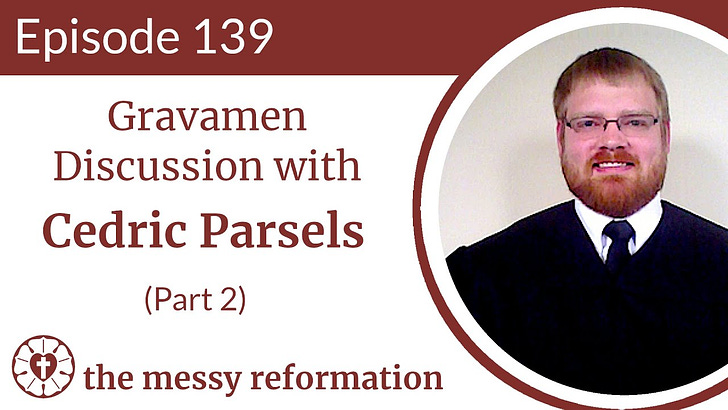"Cedric: Doesn't Jesus say that there is more rejoicing in heaven over one sinner who repents?…If we can lead people to repentance and faith, I think you're absolutely right. Even if it's one church, one classes, right?
Jason: Yeah. If you think about the amount of rejoicing that happens when one person repents, think about the rejoicing in heaven over a denomination that repents. I mean that's a glorious thing and it's a good reminder for all of us in the midst of this because there's all the political stuff that happens and there's all of the frustrating things that go on. We just want to throw our hands up and yet it's more than just trying to win. This isn't just about winning, this is about being faithful and seeing God's name lifted up—God's name glorified."
Summary of this Episode
This week Jason and Cedric continue their conversation about gravamen/gravamina. Cedric lays out the CRC’s consistent attitude toward and understanding of these has not been that they are indefinite exceptions. There are publicly-known cases of individuals holding a confessional-difficulty gravamen for around 40 years—that’s an abuse of church order. Rev. Dr. Cornelis Venema has shared if gravamina were understood as exceptions, the conservatives would have left even earlier. In the early 2000s, a Canadian classis brought to Synod that a significant portion of their churches were not using the Form of Subscription. Synod’s response was not an encouragement for them to just file confessional-difficulty gravamina so they could serve in good conscience. No, they told them to stop what they were doing and return to being in covenant. In the late 2000s and early 10s, there were Banner articles lamenting strict subscriptionism. This has been the understood practice of the CRC. Cedric argues those who have been operating otherwise have been doing so without any official basis or authority from Synod.
If they’re not meant to be indefinite or unending, Jason asks how long they should be. From Synod 2023’s Advisory Committee 8, the minority report encouraged those who file a gravamen to actively seek to resolve with the Council revisiting at least annually, while the majority report set up some additional parameters. Cedric shares with the lack of trust and health in the CRC currently, measures of accountability—including specific times—should be viewed as beneficial. He shows from the start of someone submitting a confessional-difficulty gravamen to their Council to when that could be concluded as a confessional-revision gravamen that’s been addressed by Synod with a potential study committee, we’re talking about a 5-6-year-long process. It’s not short. There are tons of resources that an individual would be directed to. There is accountability to make sure a person isn’t being lazy and putting things off. Our current polity provides lots of time to wrestle. However, at the end of all that, individuals still in disagreement must be willing to leave or submit to formal discipline. Jason reminds us the goal of any discipline, including such cases, is still reconciliation and restoration.
From there, Jason follows up on earlier comments about the low-trust environment of the CRC, and agrees that strict subscription should build trust. They both share the pain in deciding to recommend family or church members who are moving away from their area to choose a non-CRC church because the teaching cannot be trusted everywhere. That being said, one of the accusations conservatives often have lobbed at them is that they’re not ecumenical—not willing to work across denominational lines. Yet that’s not the case. Our unity is in the true church of Jesus Christ. We are looking for a home that we can in good conscience serve in and with integrity remain in. Those on the revisionist or progressive side in the CRC have yet to provide a real answer as to why they remain when they’re so against where the denomination is going. If things had swung the opposite way these last Synods, the orthodox or conservative side would most certainly be exiting. Cedric notes his personal identity is not built into the CRC. He’s willing to let that go if need be—it’s to the gospel first! Jason agrees, the downfall or end of any denomination does not mean the downfall or end of Christ’s church. While it is still alive, though, it’s worth fighting for reformation.
Cedric’s final words this time are an encouragement around the good work that is happening. There are discouraging things, certainly, but a lot of good has been done related to confessionality, sexuality, and the need and desire to be a gospel-centered denomination. Connecting past to present, the faithfulness of past generations, including persecution, has touched many people and we continue that legacy today for the glory of God.




I really appreciated the discussion. It is, however, incredibly frustrating how slow this is all moving. I had to leave my old Episcopal church because of all the many obvious theological issues there and ended up attending a CRCNA church, but now I feel like I'm just in limbo. I can't join the church because I have no solid understanding of what the denomination believes or where it is headed because the denomination itself doesn't seem to know what it believes or where it's headed. I just wish leadership would come out and explain itself clearly and stop jerking people around. If you want to be a bunch of wing-nut progressives, that's fine, just be honest about it, so I can decide if I want to be a member or not. But the affirming Biblical beliefs about homosexuality while not actually seeming to require your office bearers or churches to adhere to that standard is getting to be kind of frustrating.